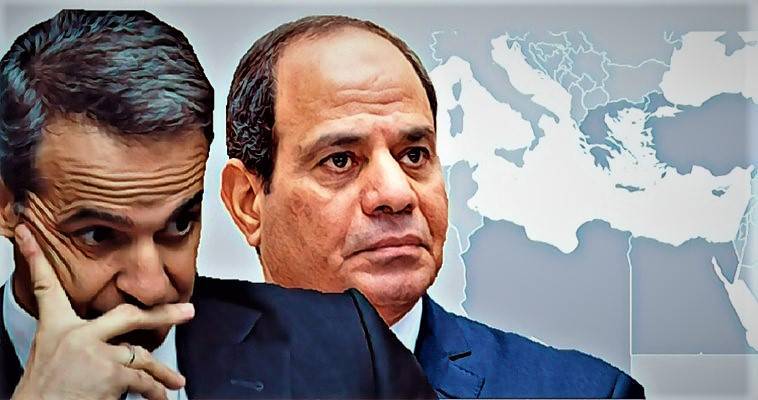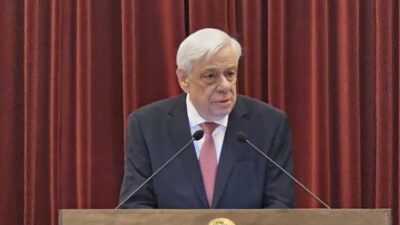Stavros Lygeros: Revealed: Egyptian diplomacy wants a limited EEZ for Crete
17/06/2020
Greek Foreign Minister Dendia’s visit to Cairo is undoubtedly crucial. In Athens, it is hoped that this time Egyptian reservations will be overcome, making it possible to sign an agreement on the delimitation of the EEZ between the two countries, or at least opening the way in this direction. A look at the map shows that such an agreement would block the Ankara-Tripoli memorandum that has become a noose around Greece’s neck.
Why has it not been possible to sign a demarcation agreement with Egypt so far, despite the fact that negotiations have been going on for many years? It is true that up to some point in time, apart from Cairo’s reservations, there was also ambiguity on the part of Athens. Athens wanted such an agreement, but at the same time it feared that it would provoke a reaction from Ankara. If, as expected, the Turks rushed to conduct investigations within the now delineated Greek EEZ, this would provoke a Greek-Turkish crisis, as Athens could not fail to defend its sovereign rights.
Cairo: Islands have an EEZ
The Greek ambivalence became de facto pointless when Ankara sent to the UN coordinates with the external limits of the Turkish continental shelf and even more so when it signed the maritime demarcation memorandum with Tripoli. And as if all this were not enough, the Erdogan regime, through the state oil company TRAO, announced it would conduct research just outside the Greek territorial waters in the Kastellorizo-Rhodes-Karpathos-Kassos-Crete arc.
Lately, therefore, Athens has been doing its utmost to sign a demarcation agreement with Egypt. According to reliable information, the initial problem was whether or not the island complex of Kastellorizo will have a full impact on the EEZ. Cairo does not deny that the islands have an EEZ, but believed that Kastellorizo, due to its size, should have limited influence.
According to the same information, Athens appeared open or accepted a limited influence of Kastellorizo, or a partial demarcation with Egypt, that is, it would concern the sea area further west. This is because a partial demarcation of the Greek-Egyptian EEZ (it would not include the sea area of Kastellorizo) will block the Ankara-Tripoli memorandum.
Egypt doesn’t want an agreement
Always according to the same reliable information, when the Greek side appeared willing to take a step back, the Egyptian side made a new demand: the islands of Rhodes, Karpathos, Kassos and Crete to have less impact, to be precise 60% of the EEZ to be given to Egypt and 40% to Greece! Although some actors inside and outside the Foreign Ministry appeared willing to discuss such a back-down (!), others put up strong resistance.
They very justifiably stressed to the minister that such a volta face would not only concern the demarcation of the EEZ with Egypt. It would be a strong political precedent in relation to Turkey as well. If Greece recognized reduced influence in Crete and Rhodes, it would have self-imposed Turkey’s position in the Aegean and in the future in Libya. In other words, it would constitute political suicide.
In fact, the Egyptian Foreign Ministry is not primarily interested in appropriating 10% of the Greek EEZ in that area. It simply does not want a demarcation agreement with Greece. Egypt’s diplomatic bureaucracy believes that if it signs a demarcation agreement, it will permanently close the door with Turkey and does not want to. As Egyptian elites characteristically claim, Cairo has a problem with Erdogan, not with Turkey.
Circles in the Egyptian Ministry of Foreign Affairs that have channels of communication with the political part of the Muslim Brotherhood entrenched themselves behind this argument. This was also seen during the Morsi government. According to other sources, in fact, the Egyptian Foreign Minister Sukri, with whom Dendias is negotiating as a career diplomat himself, is decisively influenced by the bureaucracy of his ministry, as a result of which he does not see, or perhaps does not want to see the “big picture”.
The “big picture”
The “big picture” is that the Sisi regime is not just another third party in the Greek-Turkish conflict. This was the case until Turkey’s open intervention in Libya. As is well known, the deployment of a large number of jihadists, Turkish military and huge quantities of weapon systems upset the course of the war there.
The collapsing Sarraj government not only managed to stabilize its position, but also counterattacked, occupying territory and taking the lead in the conflict. In fact, it threatens to occupy the area of Sirte and the oil wells there, from which 80% of Libyan oil is extracted. If that happens, Haftar’s side will be in danger of collapsing.
Such a development would bring the Muslim Brotherhood (through the Saraj regime) to the Egyptian border, which would inevitably fuel its illegal but powerful networks within Egypt. In other words, the Sisi regime will face a problem of destabilization, as social dissatisfaction erupts at the same time due to the pandemic and the acute economic crisis.
The ball in the court of Mitsotakis-Sisi
Especially after the clear rejection by Erdogan and Sarraj of Cairo’s initiative for a truce, the vital interests of the Sisi regime are pushing it into an anti-Turkish position. This, in turn, should push it in search of an alliance with Greece, which is facing its own problems with Turkey. Instead, Egypt is behaving as if it is a third party that is not directly affected by developments on the Greek-Turkish front.
Indicative of Cairo’s reluctance is the fact that on the Libyan front it is avoiding taking action in favor of Haftar, hoping that the Russians will do it on its behalf. The Russians may not want Libya to become a Turkish protectorate, but they have their own balances with Ankara. Their interests and priorities, therefore, do not coincide with those of Egypt.
Given this, even if FM Dendias fails to persuade his Egyptian counterpart this time around, Athens must change its tactics. Instead of the Greek Ministry of Foreign Affairs discussing the unacceptable demands of the Egyptian diplomatic establishment (Minister Sukri is also part of this), Athens should try to bypass it. This can practically be done if the talks on the delimitation of the EEZ are transferred to the Mitsotakis – Sisi level, but also integrated in a broader context.
At the point where things have come, as I suggested in an article some time ago, Athens must take the initiative to form a Mediterranean (and military) alliance with an anti-Turkish flavor, even if this is not overtly stated. Greece and Egypt have a direct and vital interest in moving in this direction, putting France in the game, in order to form a triangle, in which Israel and, of course, the Emirates and Saudi Arabia will be included in one way or another.





